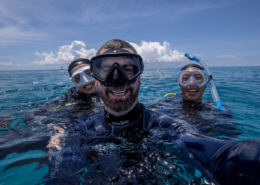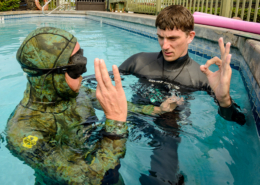Can the Mammalian Dive Reflex Help Control Anxiety?
By: Brian Shreve
In the last sixty years or so, it has become known that freedivers, those who hold their breath to dive deep under the water’s surface, benefit from the Mammalian Dive Reflex (MDR) in several ways. But can that same reflex help control anxiety? Let’s take a deeper look at the MDR, what causes it, and how it can help in anxiety and panic attacks.
The Mammalian Dive Reflex
Biologists and other scientists have long known that aquatic mammals have a series of adaptations called the Mammalian Dive Reflex, also known as Diver’s Reflex or Dive Response. It allows these animals to override their basic reflexes that attempt to keep an organism in the best condition for survival in their environment. It was only in mid-20th century that we discovered humans also were affected by the MDR. Starting with Italian freedivers around 1950, and followed by scientific studies in 1962 by Olsen and colleagues, evidence emerged documenting several unique adaptations consistent with MDR when humans were submerged in water:
- Drastically lowered heart rate, known as profound bradycardia
- Bradycardia persisted even with vigorous exercise
- Peripheral vasoconstriction, which shunts blood from limbs toward vital organs
Olsen et al. also found that submerging just the face was enough to trigger the MDR. Further studies showed that only water could trigger these reflexes, and the water had to be cooler than the surrounding air. So, the tradition of splashing cold water on your face to refresh yourself isn’t just an old wive’s tale – it provokes a physiological response in us and slows our heart.
How it Works
Freedivers have taken advantage of the MDR for decades, but it is only recently that the cause of this response was identified. In a 2015 study, Lemaitre and others found that the MDR is induced through signals sent by the transgeminal nerves in the face. These nerves are found just below the eyes and above the cheekbones. When they are stimulated with cold water, a signal is sent to the vagus nerve which has a controlling role in parasympathetic nervous system that regulates heart rate and breathing among other things.
Can MDR Help with Anxiety and Panic Attacks?
In a word, yes.
Both anxiety and panic attacks are related to an overactive or hyper-aroused nervous system. Activating the MDR gives a very sure, real-time way to reset this overactive nervous system. And no, you don’t have to take up freediving to do so! Instead, you can try one of these techniques. If you have a history of slow heartbeat, check with your physician before trying.
- Splash cold (4-12C/40-50F) water on the face, concentrating on the eye and cheekbone region
- Place ice cubes in a bag (or use a bag of frozen peas) and press against your face while holding your breath for 6-8 seconds, again concentrating on the eye and cheekbone region
- Finish your next shower with 30 seconds of cold water, at least on the face if not on the whole body
- Fill a large bowl with ice water and, while holding your breath, plunge your face in for about 30 seconds
The human system is wired for self-preservation. The fight/flight response can help us survive if our system thinks we’re in danger. If those systems take over and we lose control, however, they can lead to high anxiety or even panic. These situations can quickly spiral out of control without intervention. By engaging the MDR, we can quickly and easily help divert these out-of-control responses and reach a more calm state.
References
C. Robert Olsen, Darrell D. Fanestil and Per F. Scholander. 1962. Some effects of breath holding and apneic underwater diving on cardiac rhythm in man. Journal of Applied Physiology 11962.17.3.461
Frederic Lemaitre, Tumul Chowdhury, and Bernhard Schaller, 2015. The trigeminocardiac reflex – a comparison with diving reflex in humans. Arch. Med Sci. 2015 Apr 25; 11(2): 419-426







 William Drumm/ International Training
William Drumm/ International Training

Plaats een reactie
Deelnemen aan de discussie?Voel je vrij om een bijdrage te leveren!